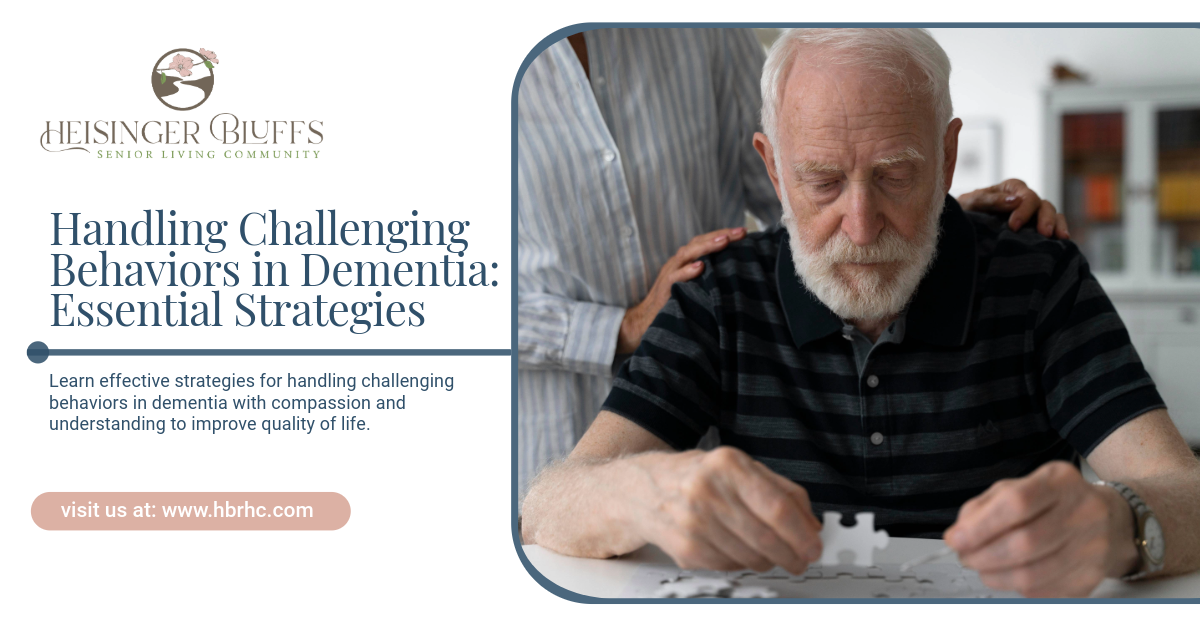Handling Challenging Behaviors in Dementia: Essential Strategies

Key Highlights
- Challenging behaviors in dementia are often rooted in unmet physical, emotional, or environmental needs.
- Common behaviors include aggression, wandering, agitation, and resistance to care.
- Compassionate strategies such as redirection, reassurance, and structured routines help reduce distress.
- Staff training and family involvement are critical to managing dementia-related behaviors.
- A supportive environment fosters dignity and improves quality of life for residents.
Dementia brings a range of cognitive, emotional, and behavioral changes that can affect both the individual and their caregivers. Challenging behaviors, such as aggression, wandering, agitation, or repetitive questioning, are not uncommon, but they can be difficult to manage without the right tools. These behaviors often stem from unmet needs, confusion, or frustration rather than intent, and learning how to address them with compassion is key to ensuring safety, comfort, and dignity.
This guide explores essential strategies for handling challenging behaviors in dementia, combining practical techniques, emotional support approaches, and staff and family involvement to create a safe and supportive environment.
Understanding the Causes of Challenging Behaviors
To handle challenging behaviors effectively, it’s essential to understand why they occur. Dementia affects memory, communication, and problem-solving, which can create frustration and confusion. Behaviors may be expressions of unmet needs.
Common Causes Include:
- Physical discomfort: Pain, hunger, or fatigue
- Environmental factors: Overstimulation, noise, or unfamiliar surroundings
- Communication difficulties: Inability to express wants or needs
- Emotional needs: Fear, loneliness, or anxiety
- Medical issues: Side effects from medication or untreated illnesses
When caregivers identify the root cause, they can better tailor their response.
Common Challenging Behaviors in Dementia
| Behavior | Description | Possible Triggers | Strategies |
|---|---|---|---|
| Agitation | Restlessness, pacing, irritability | Noise, fatigue, unmet needs | Provide quiet space, reassurance, structured routine |
| Aggression | Verbal or physical outbursts | Fear, misinterpretation, pain | Stay calm, redirect, avoid confrontation |
| Wandering | Moving aimlessly or leaving safe spaces | Confusion, boredom, restlessness | Secure environment, safe walking areas, engage in activities |
| Repetitive actions/questions | Asking the same thing or repeating tasks | Memory loss, anxiety, need for reassurance | Respond patiently, use visual reminders |
| Resistance to care | Refusing help with hygiene, eating, or dressing | Embarrassment, loss of control, discomfort | Offer choices, explain gently, ensure privacy |
Essential Strategies for Handling Challenging Behaviors
1. Stay Calm and Patient
Residents may mirror the emotions of those around them. Remaining calm helps prevent escalation. Use a gentle tone and avoid arguing or correcting.
2. Redirect and Distract
Instead of confronting behaviors, redirect residents to a different activity. For example, if a resident becomes agitated, suggest a walk or favorite hobby.
3. Create a Structured Routine
Predictability reduces anxiety. Consistent meal times, activities, and rest periods create familiarity, helping residents feel secure.
4. Modify the Environment
- Reduce noise and clutter
- Ensure adequate lighting to prevent confusion
- Provide safe spaces for walking or pacing
5. Meet Basic Needs Promptly
Check for hunger, thirst, pain, or the need for rest. Sometimes challenging behaviors signal a basic unmet need.
6. Encourage Independence with Support
Offer choices in daily activities to maintain dignity while providing guidance when needed. For instance, allow residents to choose between two outfits instead of overwhelming them with too many options.
7. Use Validation and Reassurance
Arguing about reality often increases frustration. Instead, validate feelings and offer reassurance. If a resident insists on going “home,” respond empathetically, acknowledging their emotions before gently redirecting.
Communication Techniques
Effective communication can reduce confusion and prevent escalation.
- Use short, simple sentences
- Maintain eye contact and approach residents from the front
- Use visual cues like gestures or pictures
- Listen actively and allow extra time for responses
- Avoid correcting mistakes, focusing instead on comfort and reassurance
Staff Training and Education
Caregivers and staff play a vital role in handling challenging behaviors. Training should include:
- Recognizing triggers and early warning signs of distress
- De-escalation techniques that prioritize safety and dignity
- Person-centered care approaches that respect individual preferences
- Emergency procedures for severe behavioral episodes
Well-trained staff can respond quickly and effectively, ensuring safety while preserving resident dignity.
The Role of Activities and Engagement
Engaging residents in meaningful activities helps reduce boredom and agitation. Activities should be tailored to the individual’s abilities and interests. Examples include:
- Music therapy to soothe agitation
- Art or crafts for self-expression
- Gentle exercise to reduce restlessness
- Reminiscence activities to trigger positive memories
Family Involvement
Family members are an important part of the care team. Their knowledge of a resident’s history, preferences, and routines provides valuable insight. Families can:
- Share information about triggers and calming techniques
- Participate in care planning
- Provide familiar items for comfort
- Stay informed about dementia progression and effective strategies
Compassionate Care: Balancing Safety and Dignity
Handling challenging behaviors in dementia is not just about safety—it’s about treating residents with empathy and respect. Compassionate care recognizes that behaviors are often expressions of unmet needs. By combining patience, structure, and understanding, caregivers can create an environment where residents feel secure and valued.
At Heisinger Bluffs, our memory care team is dedicated to handling challenging behaviors with compassion and expertise. We provide a safe, supportive environment where residents with dementia can live with dignity while receiving the care they need. Reach out today!
Frequently Asked Questions
Why do people with dementia develop challenging behaviors?
Challenging behaviors often arise from unmet needs, such as pain, hunger, confusion, or emotional distress. They are not intentional but rather a form of communication.
What should caregivers avoid when handling aggression in dementia?
Caregivers should avoid arguing, raising their voice, or making sudden movements. Staying calm, patient, and using redirection helps de-escalate the situation.
How can routines help manage dementia behaviors?
Routines provide consistency and predictability, which reduce anxiety and confusion. Familiar schedules make residents feel secure.
What role does the environment play in challenging behaviors?
A noisy, cluttered, or poorly lit environment can increase confusion and agitation. Creating calm, safe spaces helps reduce triggers.
How can families support staff in managing dementia behaviors?
Families can share valuable insights about the resident’s preferences, history, and triggers, helping staff provide personalized care.
Sources:
- https://www.alzheimers.org.uk/about-dementia/stages-and-symptoms/dementia-symptoms/managing-behaviour-changes
- https://www.helpguide.org/aging/dementia/alzheimers-behavior-management
- https://www.nccdp.org/a-caregivers-guide-to-managing-anxiety-in-dementia-patients/
- https://www.alz.org/help-support/caregiving/stages-behaviors/memory-loss-confusion











